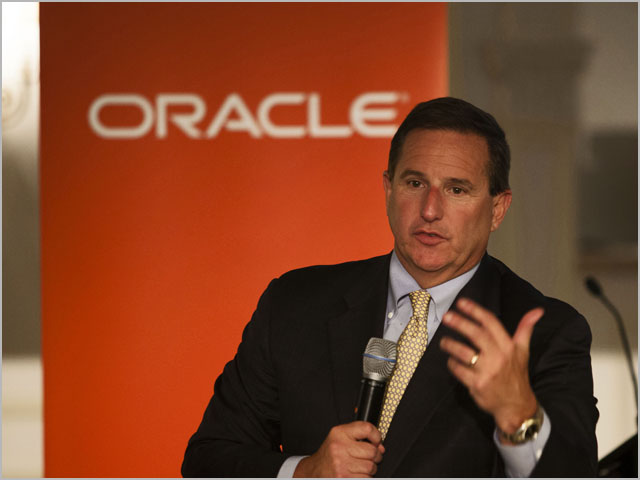 NEWS
NEWS
 NEWS
NEWS
 NEWS
NEWS
![]() Oracle gave a detailed outline of its plans for the year ahead yesterday, with President Mark Hurd reiterating the company’s broad cloud strategy across PaaS, IaaS and SaaS. There’s quite a few moves worth watching: Oracle is set to introduce storage sometime in the first half of this year; and it’s planning to roll out messaging and developer services along with its PaaS products.
Oracle gave a detailed outline of its plans for the year ahead yesterday, with President Mark Hurd reiterating the company’s broad cloud strategy across PaaS, IaaS and SaaS. There’s quite a few moves worth watching: Oracle is set to introduce storage sometime in the first half of this year; and it’s planning to roll out messaging and developer services along with its PaaS products.
Hurd was speaking alongside Oracle Executive Vice President Thomas Kurian during a 30-minute call with the press yesterday. During that time the pair announced much more than just a cloud computing update, reinforcing the company’s overall business strategy and key initiatives, which include:
Oracle has stressed how important SaaS is before, recently admitting that it derives more than $1 billion a year in revenues from this. However, Hurd yesterday refused to place “dollar figures” on sales of its third-party cloud hardware and software, saying that to do so is largely a pointless exercise – basically dismissing as worthless the cloud revenue claims of its rivals.
Probably the biggest news from Hurd and Kurian was the announcement of their IaaS plan, which, in the broadest possible terms, will be a subscription-based solution that customers can scale up or down at any given moment according to their need.
According to InformationWeek, IaaS has the potential to be a real winner for Oracle, so long as it focuses on building out private-cloud infrastructure in its own data centers. Using Oracle IaaS, customers will be able to deploy Exadata, Exalogic, Exalytics or Sparc SuperCluster servers on premises in return for a monthly subscription fee, instead of laying out a small fortune on the hardware upfront. The subscription also includes a semi-elastic, capacity-on-demand option, which allows enterprises to pay for just 75% of the server’s total capacity, with the option of paying additional fees for the extra 25% if needed.
Oracle is also offering free inclusion of PlatinumPlus services, which makes up the “as a service” element of its IaaS plan. PlatinumPlus will provide monitoring of ongoing systems, in order to identify any reliability or performance problems with the hardware, as well as compliance and security issues, and any deviations from recommended configurations detailed by Oracle. In addition, customers will also be given advice on corrective actions to take, as well as support for problems with Oracle Database, Fusion Middleware, Linux and Solaris.
Some questions remain unanswered however, such as how will Oracle take back its hardware when customers decide to scale down, and how will the company account for IaaS-related transactions in its financial accounts. Unfortunately, Hurd has very little time available to answer questions, but he did acknowledge that there will be “some blurring of licensing and subscription terms as we focus on the customer”. Ultimately, he said, Oracle’s goal is to let customers use its products under the terms of their choosing.
Oracle has achieved several notable milestones since announcing its big cloud push back in September/October last year, said Kurian. Oracle delivered new releases of its SaaS offerings in the public cloud – including sales and marketing, ERP, talent management, HR, customer service and others.
We can expect to see more integration across Oracle’s cloud platforms. It already looks like Oracle’s Database and Java are now integrated with RightNow and Taleo, two SaaS offerings acquired by Oracle last year.
Finally, Kurian also mentioned two new releases of Oracle’s social products, which offer social engagement and monitoring tools, and social relationship management tools, as well as several new datacenters opened by the company – two in the Asia-Pacific region and two in Europe.
THANK YOU